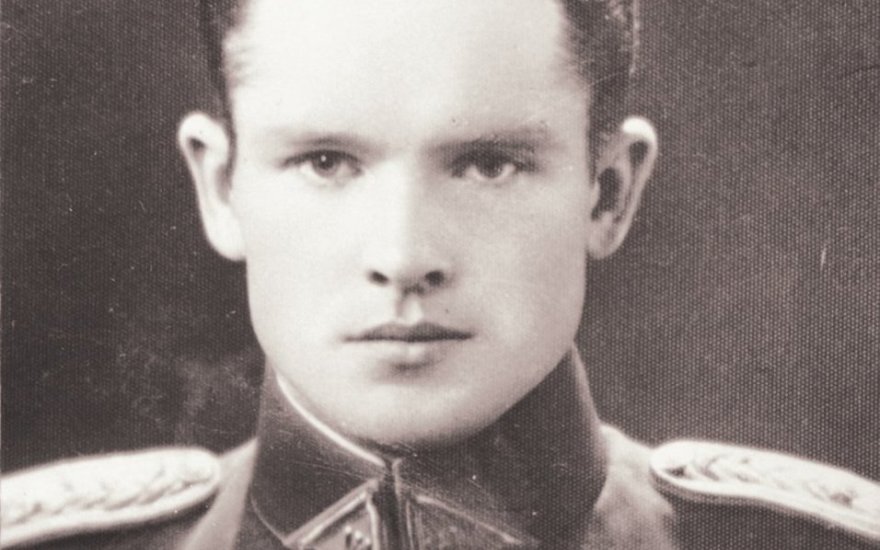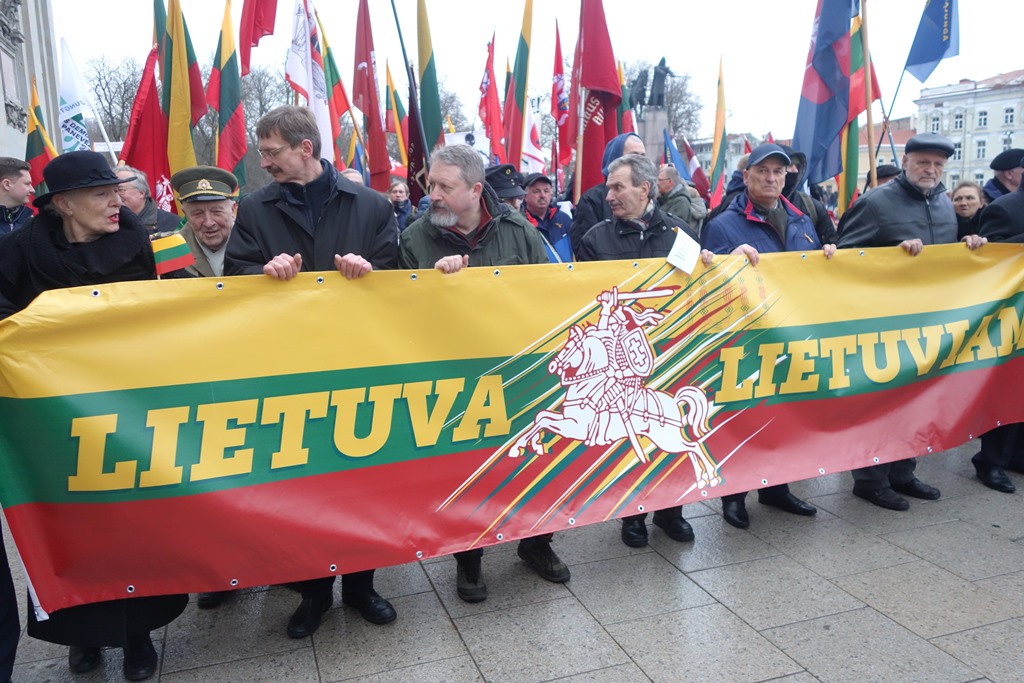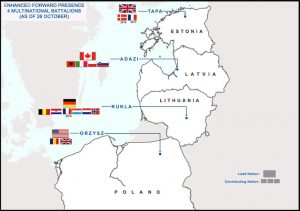
Views: 1779
Foti, a 60-year-old high school teacher from Chicago, made the pledge to her dying mother 18 years ago. She has spent a long time studying the life of her grandfather, Jonas Noreika, as well as acquiring the writing skills necessary for chronicling it and finding a publisher.
Barring unexpected delays, Silvia Foti is months away from fulfilling an old promise that’s become her life’s work: to write a biography of her late grandfather, who is a national hero in his native Lithuania.
But rather than celebrating Noreika’s legacy as her mother requested, the biography that Foti wrote confirms and amplifies the findings of Holocaust scholars who for years have called for stripping Noreika of his honors.
The national hero, she and they insist, was a Nazi collaborator who helped murder thousands of Jews and steal their property.
The unpublished biography, which Foti summarized in a bombshell Salon article in July, split her own family. She said her father and his second wife asked Foti not to publish the book because it would “make Lithuania look bad.” And it would have distressed her mother if she were still alive — the author said this causes her “great pain.”
But the main significance of the book is the unprecedented attention it is bringing to Noreika’s alleged crimes in Lithuania, where a school has been named for him. Noreika died in 1947 while in the hands of the KGB. In 2000, former president Vytautas Landsbergis, the first head of state of independent Lithuania, attended the funeral of Noreika’s wife in Vilnius.
Last week, Foreign Minister Linas Linkevicius urged authorities to remove a memorial plaque to Noreika from the wall of the Lithuanian Academy of Sciences in central Vilnius – the first such call by a senior Lithuanian official on any of the country’s numerous monuments celebrating killers of Jews.
Following the Salon article and coverage of it in The New York Times, Vilnius Mayor Remigijus Simasius, who for years has ignored calls by Jewish groups to remove the plaque, asked the state-funded and -operated Genocide and Resistance Research Center to review Noreika’s status as a national hero.
In her book, Foti explores how her grandfather issued orders to round up and kill the Jews after his appointment in 1941 as head of Siauliai County under the German Nazi occupation. And she presents evidence that he personally moved into the home of a Jewish family after its members had been killed, presumably at his order.
Foti recalled being shocked when she first learned of these allegations in 2013 while visiting the school in Sukionių named for her grandfather. The principal told her that “he got a lot of grief from the Jews” over the name, but assured her it “was all Soviet lies.”
That remark put her on a path to unravel the history of Lithuanian Jewry’s murder and her grandfather’s complicity in it. At first she had “hoped to exonerate him,” Foti said. Yet a wealth of evidence convinced her that her grandfather was complicit and actually “taught his Lithuanian soldiers how to exterminate Jews efficiently: how to sequester them, march them into the woods, force them to dig their own graves and shove them into pits after shooting them,” as she wrote in the Salon article.
It was a devastating discovery for a woman who said she grew up “adoring” her late grandfather. At Christmas dinners, her tight-knit family would leave an empty chair and glass of wine for him to acknowledge the absence of the handsome man in framed portraits who probably was tortured to death by the KGB at the age of 37.
Foti said she hopes the book helps “Lithuania finally take a good look at its own role in the Holocaust and stop blaming the Germans for everything.”
She has had to pray and seek guidance from God throughout her work on the book, she said.
The debate about Noreika and other collaborators who sided with the Nazis when they were fighting Russia during World War II goes to the heart of Lithuania’s national narrative that it was and is a victim of Russia. Seen through that prism, collaborators like Noreika or Juozas Ambrazevicius, the leader of a local pro-Nazi government, sided with Germany only to achieve independence for Lithuania.
But that narrative ignores the level of complicity by ordinary Lithuanians — many of whom viewed Jews as agents of communism — in the near total annihilation of the approximately 220,000 Jews who lived in Lithuania before the Holocaust, according to Efraim Zuroff, the Eastern Europe director of the Simon Wiesenthal Center.
Zuroff believes that the veneration of people like Noreika in some ways is rooted in a collective desire to whitewash Lithuanian complicity.
“You see this tendency across Eastern Europe,” he said, “but it’s strongest specifically in the countries with the highest amounts of genocide complicity.”
Lithuania is the only Nazi-occupied country noted by Israel’s Yad Vashem museum for its people’s “enthusiasm” for collaboration with Germany. And even when this enthusiasm “subsided … hostility towards Jews and denunciation persisted,” the museum says.
One example of this genocidal zeal occurred in Kaunas, Lithuania’s second city. At the Lietukis Garage, pro-German Lithuanian nationalists killed more than 50 Jewish men in 1941 by beating, hosing and then murdering them with iron bars, according to the U.S. Holocaust Memorial Museum. Some of the perpetrators then posed for pictures with the victims’ tortured bodies, providing some of the most memorable images of Nazi collaboration anywhere.
Foti’s research turned the plaque for Noreika into a symbol for the fight for recognition of that complicity. But the plaque is just one of numerous expressions of veneration for perpetrators.
Juozas Krikstaponis, a member of a death squad who killed thousands of Jews in Lithuania and Belarus, has a monument for him in the city of Ukmergė, 30 miles north of Vilnius.
The Nazi collaborator Kazys Skirpa, who represented his nation in Berlin during World War II, has a main street named after him in Kaunas, and his image features regularly in nationalist marches. An outspoken anti-Semite, Skirpa “proposed to solve ‘the Jewish problem’ not by genocide but by the method of expulsion from Lithuania,” the Genocide and Resistance Research Center of Lithuania asserted in 2015.
Against this background, the developments around Foti’s article have surprised veteran campaigners for Holocaust recognition in Lithuania.
Zuroff acknowledged that Jewish Holocaust scholars like himself are “easy to dismiss” in Lithuania as Russian agents or disgruntled enemies of the Lithuanian nation. Even ethnic Lithuanians who try to confront complicity quickly get labeled as traitors.
In 2015, Zuroff co-authored a landmark book with Ruta Vanagaite, a successful writer who is not Jewish, that chronicles their joint travels across many of the killing sites of Jews that dot Lithuania and their history. “Our People” also features Vanagaite’s discovery that two of her close relatives, her grandfather and uncle, were active in the persecution of Jews.
But Vanagaite’s publishing house last year dropped her as the mainstream media attempted to discredit her. Landsbergis, who was Lithuania’s first leader after communism, published an op-ed on the Delfi news site calling Vanagaite a “moral scumbag” and “Mrs. Dushanski” – a reference to the Jewish KGB officer Nachman Dushanski.
Vanagaite’s publishing house also recalled all of her books, only one of which was about the Holocaust. And the governing coalition in April introduced a bill banning the sale of books that “distort historical facts” in what was seen as direct reaction to some of her claims about World War II.
Whereas Vanagaite’s ties to Zuroff and liberal credentials made her vulnerable to smear campaigns, Foti “totally blindsided the Lithuanian government,” according to Grant Gochin, a Los Angeles-based financial adviser of Lithuanian-Jewish descent. Gochin is behind multiple lawsuits over his ancestral homeland’s veneration of war criminals, including Noreika.
“They can’t call Noreika’s daughter a Soviet agent, they can’t defend against her,” he said.
In this respect Foti, who also favors the removal of the plaque honoring her grandfather and other honors, landed a rare victory for Zuroff, Vanagaite and Gochin’s side. She also highlighted their fight to the outside world.
But the officials who said they favored steps to remove Noreika as a national hero were “clearly paying lip service,” Gochin said, “or it would’ve happened long ago.”
As long as Lithuanians are taught to revere people like Noreika, Gochin said, “the fight for historical accuracy is being lost.”
“Genocide,” he said, “needs to be acknowledged where it happened.”
Originally published on 2018-10-04
Author:
Source: JTA – Jewish Telegraphic Agency
Origins of images: Facebook, Twitter, Wikimedia, Wikipedia, Flickr, Google, Imageinjection & Pinterest.
Read our Disclaimer/Legal Statement!
Donate to Support Us
We would like to ask you to consider a small donation to help our team keep working. We accept no advertising and rely only on you, our readers, to keep us digging the truth on history, global politics and international relations.
FOLLOW US ON OUR SOCIAL PLATFORMS












